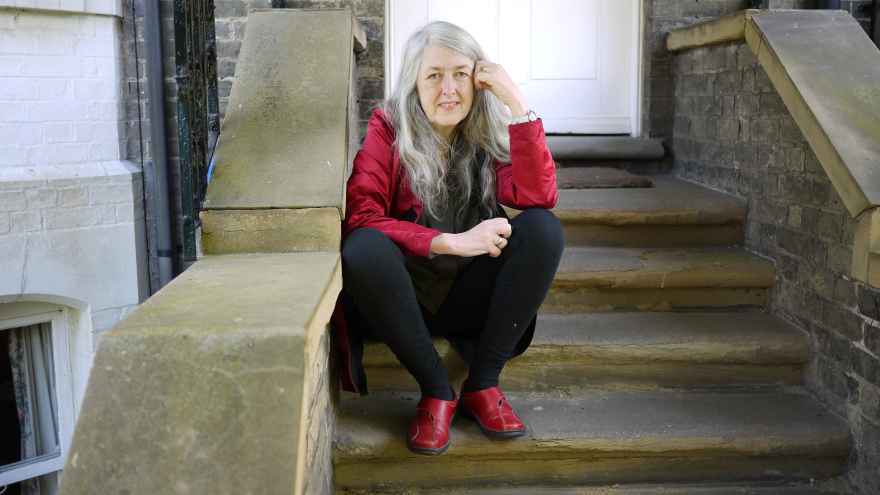Scholar Mary Beard to Deliver Lecture Series on What We can Learn from the Classics

The following was published in UChicago News on March 27, 2023.
By Sara Patterson
When Mary Beard’s broadcasting career took off in her mid-50s, she became one of Great Britain’s best-known and most beloved academics thanks to her candor, knowledge about the ancient world and original insights.
Beard has the rare combination of wit, warmth, scholarship and genuine concern for her audiences—from the general public to the generations of students she taught at Cambridge University for more than 40 years.
In April, Beard will discuss “What Can We Learn from the Classics?” as part of the Randy L. and Melvin R. Berlin Family Lectures, hosted annually by the Division of the Humanities at the University of Chicago. Her lecture series will begin April 20 and continue April 25 and 26 at the Rubenstein Forum—both in-person and live streamed—from 6 to 7:30 p.m. CDT. Registration for the series is free and open to the public.
Since 2014, the Berlin Family Lectures have featured speakers who are making significant contributions to the arts, humanities and humanistic social science. Past speakers have included political theorist Danielle Allen, Nobel laureate Mario Vargas Llosa and scholar Lawrence Lessig.
Beard’s belief that teaching the humanities is essential to a successful university and a successful society resonates at academic institutions such as UChicago. The University has withstood criticism about the value of the humanities and continues to educate its students with its core curriculum of courses in the humanities and a graduate studies program in the Division of the Humanities.
Beard stepped down from her teaching duties at Newnham College at the University of Cambridge in 2022, but she continues her research and writing (a new book Emperor of Rome will be published in the fall 2023), to host BBC programs on Roman history, writes a blog called “A Don’s Life” in The Times Literary Supplement and serves as its classics editor.
In 2018, she became Dame Commander of the British Empire for her services to the study of classical civilizations. Beard received the Wolfson History Prize in 2009 for her book Pompeii: The Life of a Roman Town (2008), the Bodley Medal in 2016 for her outstanding contributions to the world of books, the Getty Medal in 2019 for achievements in the arts and honorary degrees from Oxford University, Yale University and University of St. Andrews, among others.
In this edited Q&A, the classicist discusses why studying the ancient world encourages us to think differently and how diverse cultures and civilizations are conversations that we shouldn’t lose.
Why were you drawn to the format of the Berlin Family Lectures—three lectures under one theme?
It is a tremendous honor to be invited to give the Berlin Family Lectures in 2023. I am attracted by giving lectures that engage with the ancient world but are aimed at a wider community in the humanities and a wider public. I shall be doing three lectures which for me, and my topic, is a great number. It gives the presenter more space to develop ideas than the single lecture format, but there is still a brevity and punchiness about it. That will help me to concentrate my thoughts. I am hoping for a great dialogue with the audience during the Q&A time frame.
Why is studying the classics relevant to our current lives and culture?
That is one of the things I want to address directly or indirectly in my lectures: How do you explain what the point of studying the ancient world is to someone who does not take that for granted. It is very clear to me that the ancient world does not offer us ready-made answers to modern dilemmas. But I think it does encourage us to think differently, to look on our own world with new eyes, to challenge our own assumption and to see where they come from.
TV audiences and the readers of your books adore how you bring history to life and make it gritty and real. How do you host TV programs and write books are so relatable?
To be honest, I shoot from the hip! I try to share what interests me about the ancient world with a wider audience. It has so often been said that so little survives from the classical world, so that all you can do is talk about elite white men. That is simply not true. We have often chosen to notice only the stories of those elite white men and not to notice the others. So that is different. You only find what you are prepared to see. I think that we should all be better at opening our eyes.
Why does studying and understanding different aspects of the humanities such as different cultures and civilizations matter to us?
Culture and civilization are not things. They are conversations. If we don’t keep the conversation going, we will lose it.
Why is it important to understand more about the everyday lives of the people from ancient civilizations and relate to it and differentiate it from current times?
One of the perennial questions for the historian is: How far is the past the same as the present? And: Can we, or should we, judge the past by our standards? Those are very tricky, even insoluble, issues. I think, however, that we can start engaging with them most productively if we look at the small scale and think about the ways that domestic issues and assumptions are, and are not, shared.
Berlin Family Lectures 2023 Schedule of In-Person and Virtual Presentations:
- Thursday, April 20, 6 p.m. CDT: “A Piece of Cake” at the Rubenstein Forum and on Zoom
- Tuesday, April 25, 6 p.m. CDT: “The Shock of the Old” at the Rubenstein Forum and on Zoom
- Wednesday, April 26, 6 p.m. CDT: “Fear and Loathing” at the Rubenstein Forum and on Zoom
Free registration is available at https://berlinfamilylectures.uchicago.edu/.